Ebo forest in Cameroon is one of the intact forest ecosystems in the Gulf of Guinea, stretching over 2000km2. It is a massive biodiversity hotspot, which is why in 2006 a part of it was proposed as a national park.
The Ebo forest is home to at least 160 species of birds, most of which are unique to Ebo. Among them is a small gorilla population of unknown taxonomy, a population of the Nigeria-Cameroon chimpanzee, forest elephants, drills and the critically endangered Preuss’s red colobus. Many of these are on the Red List of Endangered and Critically Endangered species of the IUCN (International Union for Conservation of Nature). Furthermore, Ebo forest is an important carbon sink, containing an estimated 35 million tonnes of carbon.
When we visited the area in 2018, we repeatedly heard from locals that this wildlife was at risk. We saw animals wandering too close to the villages, clearly visible jumping from one tree to another. The deforestation already undertaken by Greenfil, a local subsidiary of Azur (producer of palm oil, butter, and other products) have already put the precious biodiversity here under pressure.
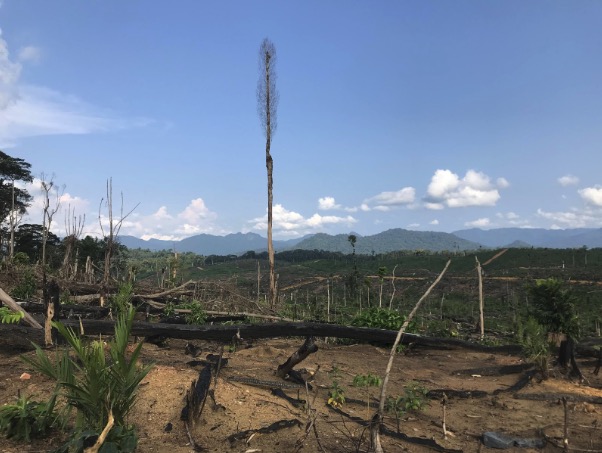
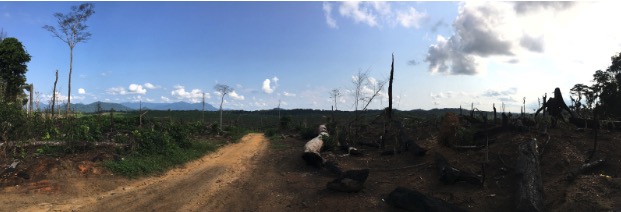
Picture: Massive deforestation in the Greenfill plantation (@Greenpeace Africa, 2018)
In 2013, Greenfil, acquired 35,000 hectares of land (which have since been expanded to 123,000 hectares!) for an agro industrial palm oil plantation in Yabassi, to the West and North West of the proposed Ebo National Park. The choice by the Cameroonian government to hand over rights to a palm oil company has affected at least 11 villages. In 2014 and 2015 Greenpeace Africa sent letters to Azur expressing our concerns urging action. In 2018 RFUK published a report highlighting the severe impact of the company on the Ebo forest and its great apes, the undermining of customary rights of local communities, human rights abuse, illegal logging and the lack of proper FPIC (free, prior and informed consent) and proper compensation. Like all other agro-industrial companies in Cameroon, Greenfil replied by making several false promises. We’ve seen the same pattern with palm oil company Herakles Farms / SGSOCs and rubber company Halcyon Agri / Sudcam.
As we saw the massive deforestation taking place around Ebo forest and its impacts already on communities and biodiversity, it was difficult to comprehend how authorities could be content with such destruction, so long as their pockets are filled with some dirty money.
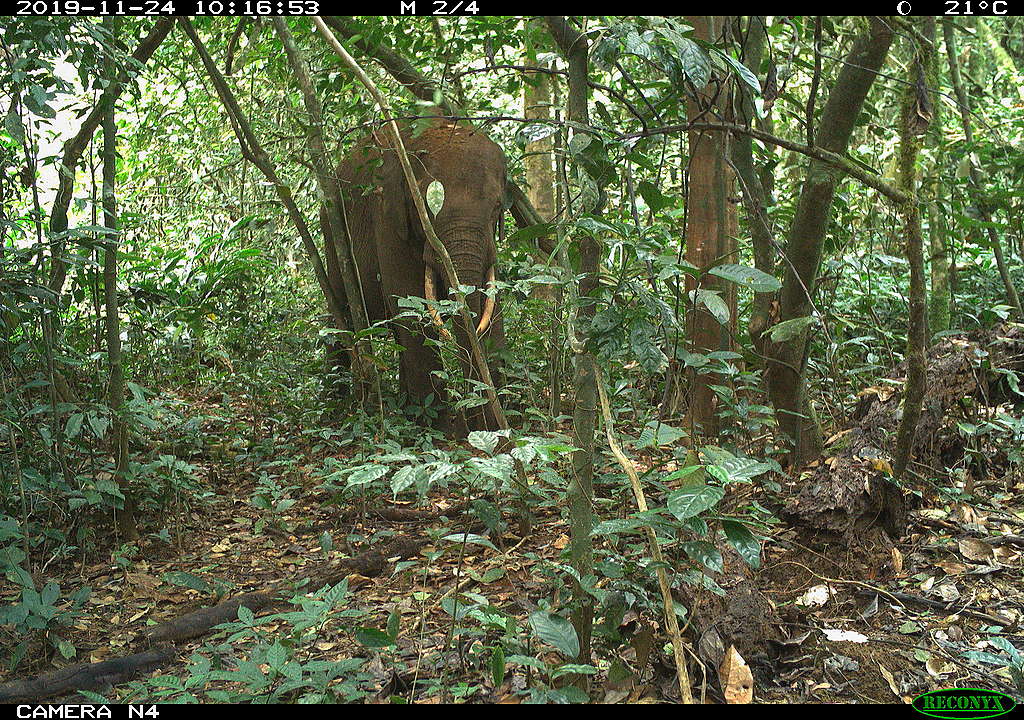
For more than 14 years, the government has been dragging its feet with the process of converting Ebo forest into a national park. It is therefore remarkable how quickly it declared massive parts of the forest as new UFAs (logging concessions). Just over a month ago, it decided to turn an area of nearly 150,000 hectares of pristine forest – roughly the size of London – into a logging concession. The notion that conservation and timber extraction can go hand-in-hand is downright absurd. Government officials can get extremely efficient and creative when it comes to enriching themselves.
More than 40+ communities surround the proposed UFAs. They rely on the forest for non-timber products such as food and medicines, to perform cultural rituals and more. No one consulted their chiefs on the rapid classification process of the UFAs and communities will end up losing much of their livelihood. Some might have to migrate.
The eight agro-industrial plantations that operate in Cameroon (HEVECAM, SUDCAM, SOCAPALM, PHP, BIOPALM, SEMRY, RUBBERCAM, SOSUCAM) have a revolting record of land grabbing, abuses of human rights that include sexual assaults, and environmental crimes that aggravate the climate and extinction crisis. There is no reason to allow such scandals to happen to more than 40 communities surrounding the Ebo forest by the logging industry. The rainforest is a blessing to those communities and to the entire world. Let it not become their curse. Let’s protect our forest. Let us say no to the two new logging concessions issued by the government of Cameroon. As we know, the profiteers of such concessions are never the people – but always a small group of self-serving elites. To prioritize the protection of local communities and the planet, Greenpeace Africa has joined the campaign to save Ebo forest. Please join us and help save Ebo forest by signing our petition.
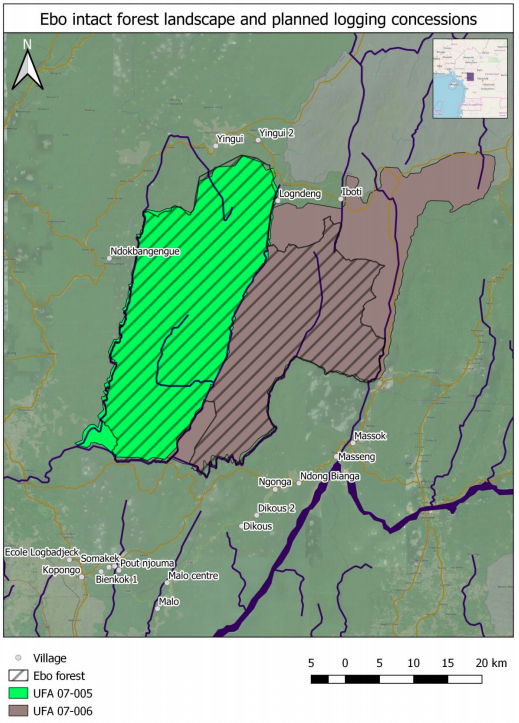
Notes:
[1] Ekwoge E. Abweand Bethan J. Morgan., 2008. The Ebo forest: Four years of preliminary research and conservation of the Nigeria-Cameroon chimpanzee (Pan troglodytes vellerosus). 2008 Pan Africa News, 15 (2) 5.
[2] Morgan BJ, Abwe EE, Dixson AF, Astaras C. 2013. The distribution, status, and conservation outlook of the drill (Mandrillus leucophaeus) in Cameroon. International Journal of Primatology 34(2): 281-302.
[3] Morgan BJ, Wild C, Ekobo A. 2003. A newly discovered gorilla population in the Ebo forest, Littoral Province, Cameroon. International Journal of Primatology 24: 1129-1137.
[4] Greenpeace Africa, 2020. Cameroon government pushes new logging plans amidst a global coronavirus crisis: https://www.greenpeace.org/africa/en/press/9232/cameroon-government-pushes-new-logging-plans-amidst-a-global-coronavirus-crisis/
[5] Whytock RC, Morgan BJ. 2010. The Avifauna of the Ebo forest, Cameroon. Malimbus, 32(1), 22-32.
[6] Global Forest Watch (2020) http://bit.ly/2Q1oTfF
[7] Ana Osuna Orozco, 2018. Palm off. An investigation into three industrial palm oil and rubber projects in cameroon and the republic of congo. RFUK, May 2018.https://www.rainforestfoundationuk.org/media.ashx/palmoilreportenweb.pdf
[8] Avant projet cahier de charges Ndogbaguengue. https://drive.google.com/drive/folders/163l2MjHeLp9-DstNDuF6JE6DjQJn23aq?usp=sharing
[9] Mr. Essame Mba Jean (chief of service for cartography in the Ministry of Forestry and Wildlife).
[10] https://www.landcam.org/sites/landcam/files/resources/NOTE%20DE%20POSITION%20EN.pdf
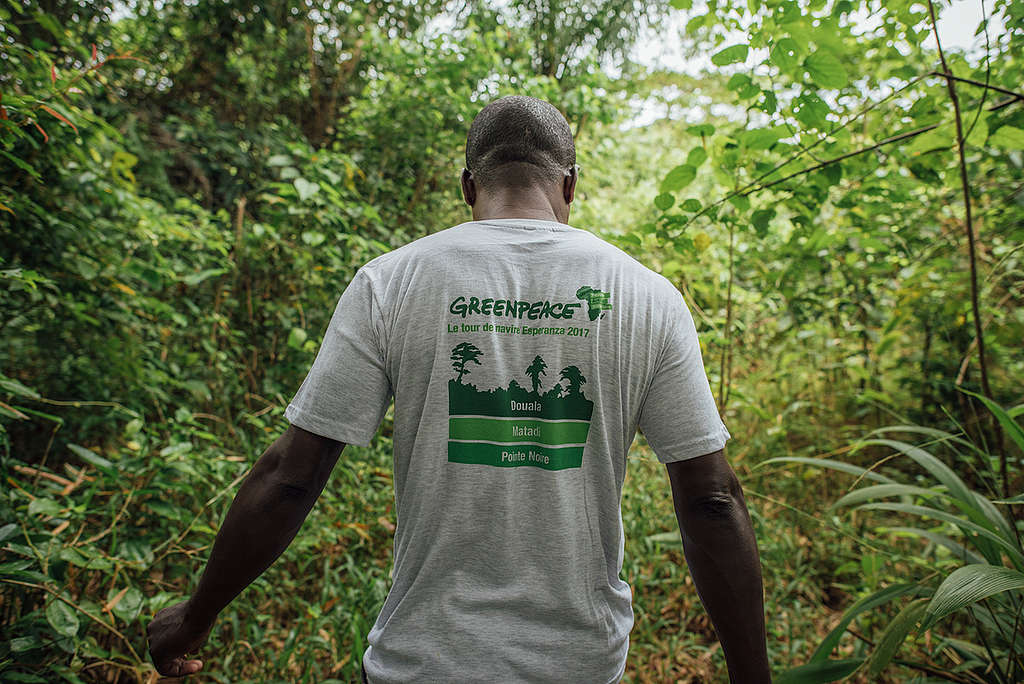

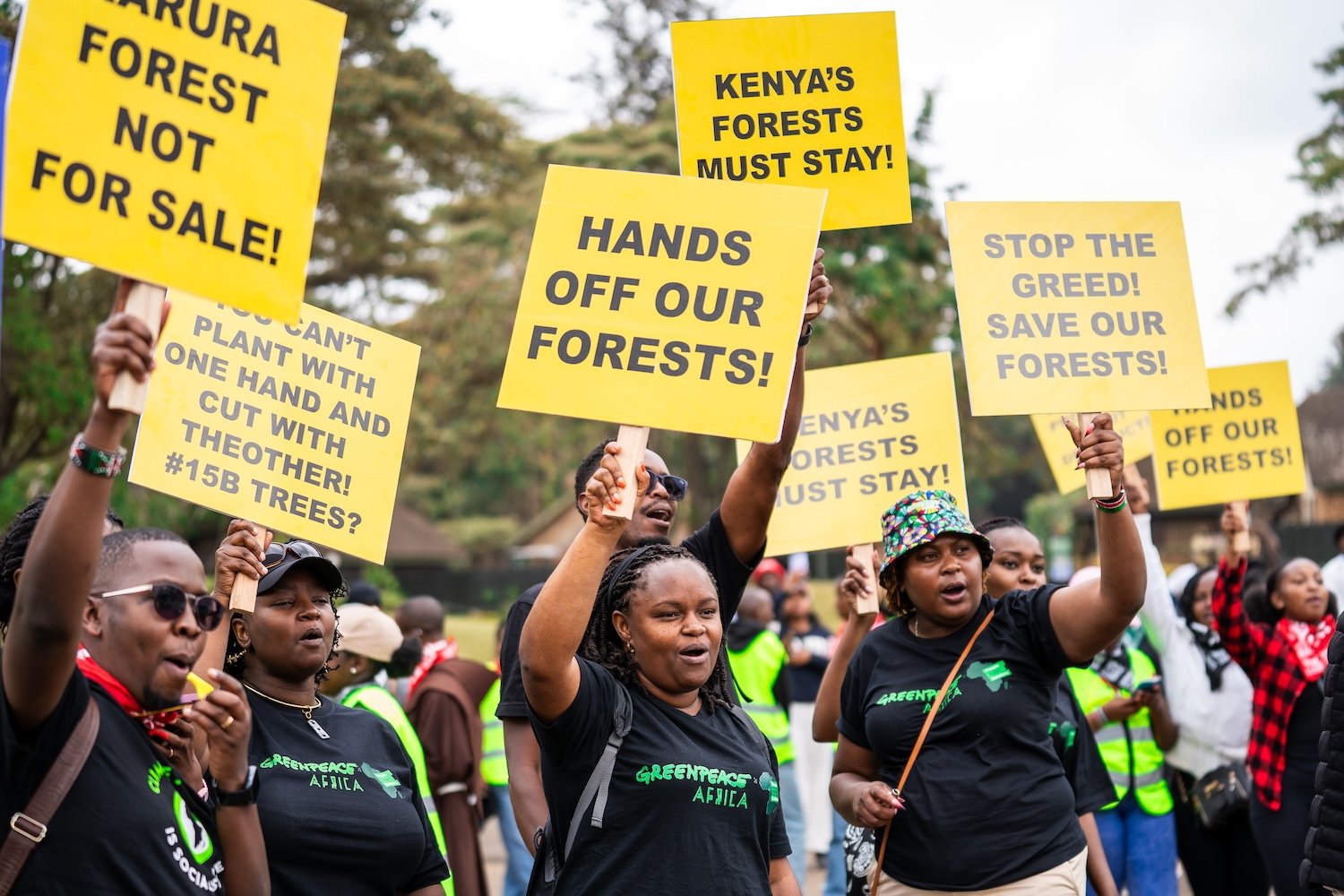
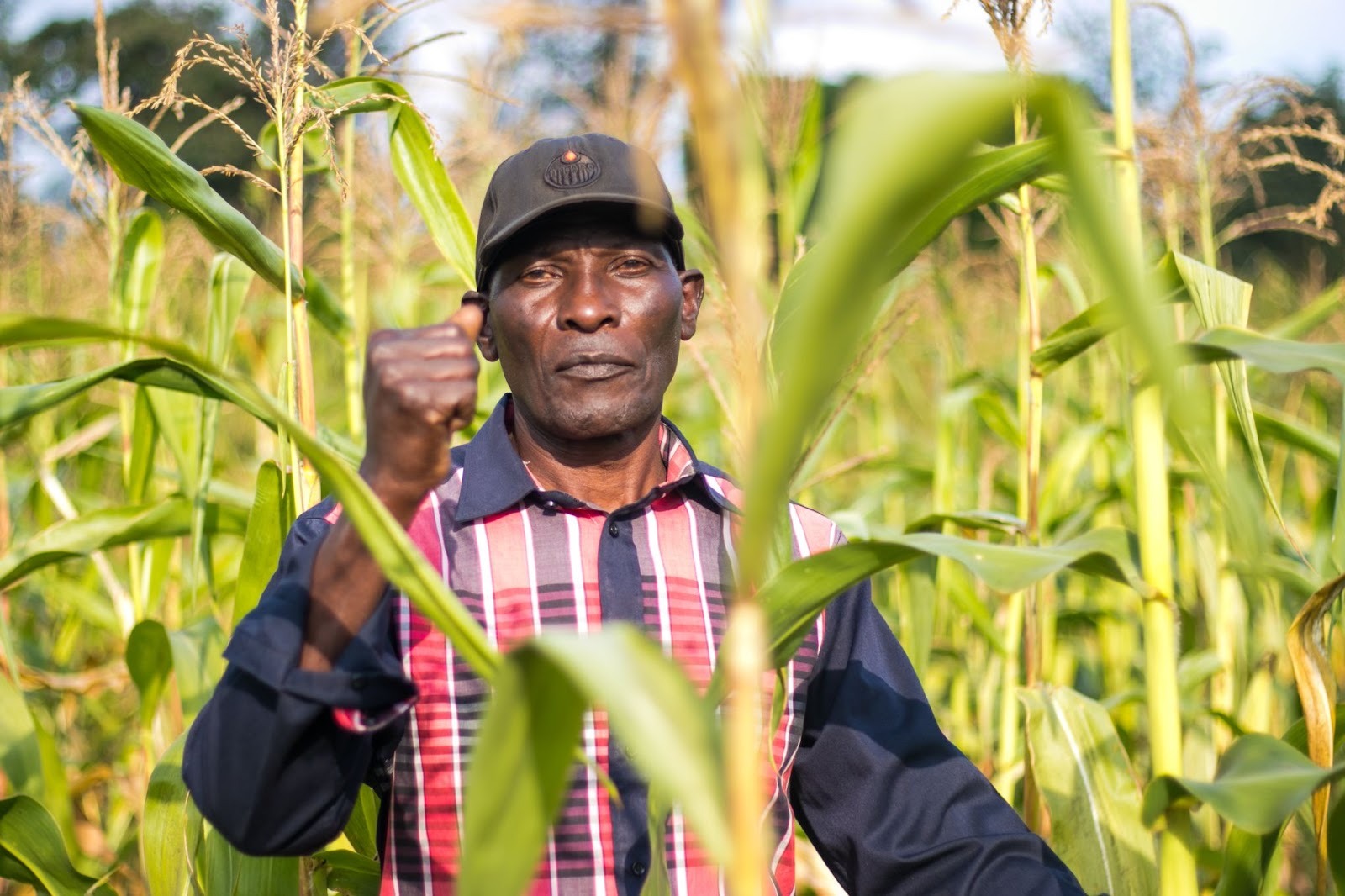
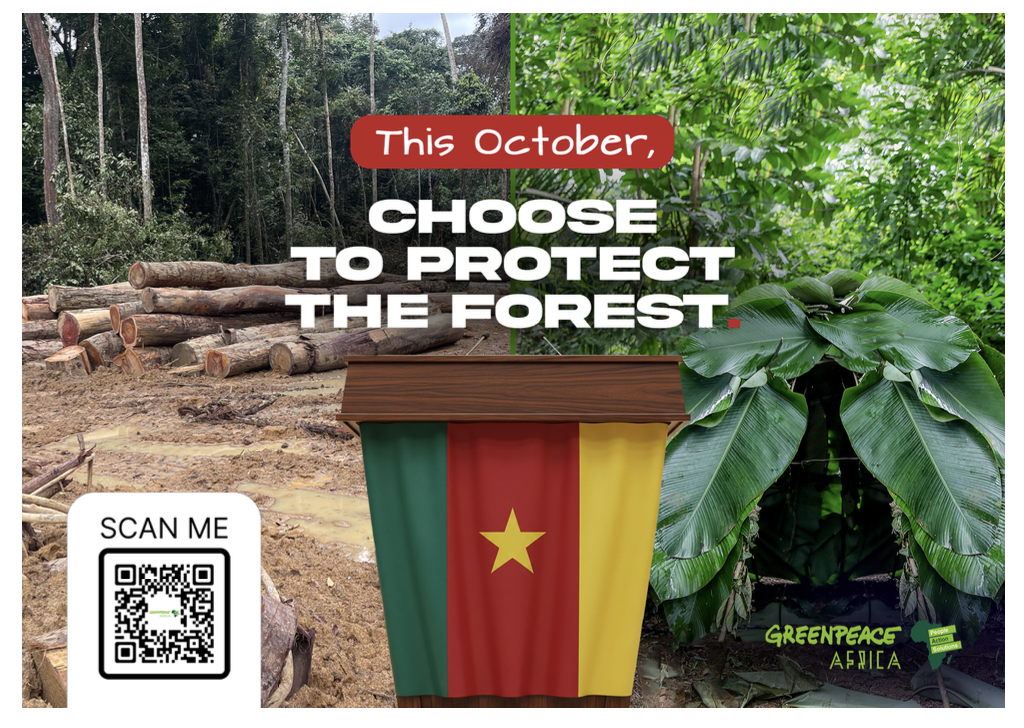
Discussion
In deepest opposition to the deforestation of Ebo Forest! The world needs to be planting forests at this critical time -- definitely NOT contributing to further deforestation and habitat loss! This has to be stopped! If the forest and its ecosystems get destroyed there will be no reversing this unspeakable loss, no reversing the precious animal lives lost! Destroying this forest should be classified against a CRIME against humanity and against the environment. It must not be allowed to happen -- especially not for short-sighted gain and profit for a few. NO NO NO!
Ask Paul Biya, President of Cameroon to cancel plans for industrial logging in Ebo forest and to designate it as a national park instead.. Sign our petition NOW. >> https://act.greenpeace.org/page/64770/petition/1
Please think of the next generation!
Better green future for all.
For green planet.
This change should be implemented as soon as possible.